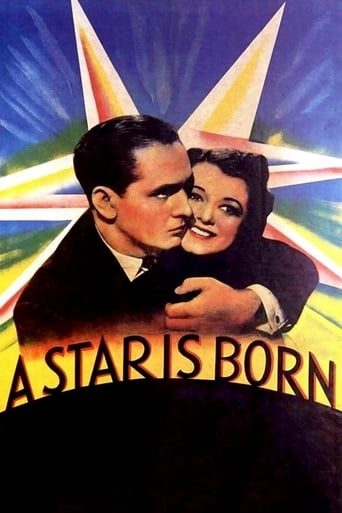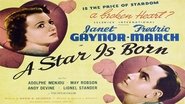ritasabrina
It seems you can't help making comparisons...well, I must admit that before seeing "A star is born"1937 version I was sure nothing could surpass the intensity that Judy Garland brought to the role of Vicky Lester in the fine Cukor version; I was wrong ,I was moved beyond words by this picture which is at the same time one of the most cruel and adult movie ever made on Hollywood and a poignant, heartbreaking love story. I admired so much the superior dialogue and, most of all,the brilliance of the whole cast-.Janet Gaynor, though maybe not the ideal choice for the role of Vicky Lester, gives a sincere, sensitive performance but what really makes this picture outstanding is Fredric March's superb portrayal of Norman Maine.He really makes Norman came alive as a real human being, weak, charming, self disruptive but generous and capable of love. A multi-faceted, restrained performance that after so many years still touches the heart
lavatch
This 1937 version of "A Star is Born" is wedded to its era in the declamatory, over-the-top acting style. While Janet Gaynor and Frederick March are good in the leads, the ensemble is weak in its old-style, ham acting.The film attempts to chronicle the rise of a young actress in opposition to the decline of the actor who has assisted her on her ascent to becoming a Hollywood star. Gaynor is especially delightful in the naive starlet. March is less convincing as the alcoholic, self-destructive Norman Maine.The film begs comparison with the 1954 film that featured James Mason and Judy Garland. In that version, the actress is also a singer, and the film showcased the unlimited talents of Garland. By contrast the Gaynor-March film was bland and non-engaging. The 1954 film also featured the talents of director George Cukor with stunning widescreen cinematography.Both films capture the smug and cutthroat world of Hollywood. But in the Gaynor-March version, once the young actress Vicki Lester has become a star, the momentum of the film is lost. The 1937 version of the film simply has not stood up to the test of time.
tmpj
Fredric March is one of my very favorite actors, and almost all of his movies are quality merchandise. I've not seen them all, but of all that I have seen, they all rate high in my book. This version of "A Star Is Born" is very special...it was made just a decade after pictures converted to sound. If we put the action 'right in the moment', one wonders how Norman Maine could have been washed up in less than a decade...especially if he passed all the rigorous criteria to make it into the talkie era. But we must suspend common sense for a time, in order to get into the movie. His star is fading even as we are introduced to him. Wine, women, song, and the theatre of the bombastic have all taken their toll on Norman. Everybody is back-biting him as being washed up in the business...and all seem to know it ...except Norman, that is. Meeting aspiring starlet from the Midwest, Esther Blodgett, is a bit of serendipity for both of them...though with different outcomes. He arranges a screen test, even twists the producer's arm to star her in a vehicle, which is a success. As her star rises, his continues to fade and fade until he is practically dead in the business. If he had problems when he was still a star, you can imagine what horrors he must have endured as his career is eclipsed by that of his wife, now known as Vicki Lester, who has begun to appear in her own highly acclaimed movies...even winning a coveted Academy Award (which Gaynor did in fact win some years earlier...the first actress to be awarded in her category). Humiliation is piled upon humiliation for Norman. Vicki loves him so much that she decides to put the brakes on her own career to take care of him. Norman now sees that he has lost all that he had, but cannot endure this selfless sacrifice his wife is making. If you have not already seen the movie ( are there aliens living amongst us?) or one of its several derivatives, I will stop there, and let you see the movie for yourself. The performances are sensitive, and this was probably one of Hollywood's first efforts to look at itself with some measure of honesty. The viewer connects with Esther Blodgett and her aspirations, and they want her to win. Fredric March draws out the true tragedian that Norman Maine represents, and his performance shows how pitiful one can become when one's life is shattered and dreams and ambitions disappear like snowdrifts in the springtime. Kudos go to Adolphe Menjou as producer Oliver Niles, Lionel Stander as the no-nonsense PR man ( what a contradiction in terms), who has no sympathy for Norman and contributes to Maine's ultimate decline...and to May Robson. May we all have a Granny like her to come to the rescue in our darkest hour. This version of a "Star Is Born" is best because it is the most dramatic and most honest of the numerous versions. It is raw and gritty, yet it never loses its focus or sensitivity. See the other versions of the movie if you feel you must, but do make an effort to see this one first.
jonathankamiel
It took me a long time to get round to seeing this classic and perhaps my expectations were a little unrealistic but I struggled through this film. May Robson plays the role of grandma admirably enough, but the beginning was unbelievably corny and the dialogue throughout the film is not particularly sophisticated apart from a retort or two from Fredric March. Without March, I don't think I could have made it through to the end of the film. And I'm prepared to accept that Janet Gaynor is a great actress but she's so underwhelming as Vicki Lester. Judy Garland might not have been a stunner but as soon as she opened her voice to sing, all was forgiven. And I think Gaynor's casting makes the whole film's premise extremely difficult to believe. I remember reading more than once that this film is still one of the most accurate portrayals of Hollywood at the time and it definitely touches on the cruelty of the star system which sees one actor catapulted into the stratosphere while another falls from great heights into the gutter. However, I think there's a more cynical side to this movie's message. And that was to keep feeding the audience with the mantra that anyone can make it in movies, however "average" your looks or talent.






